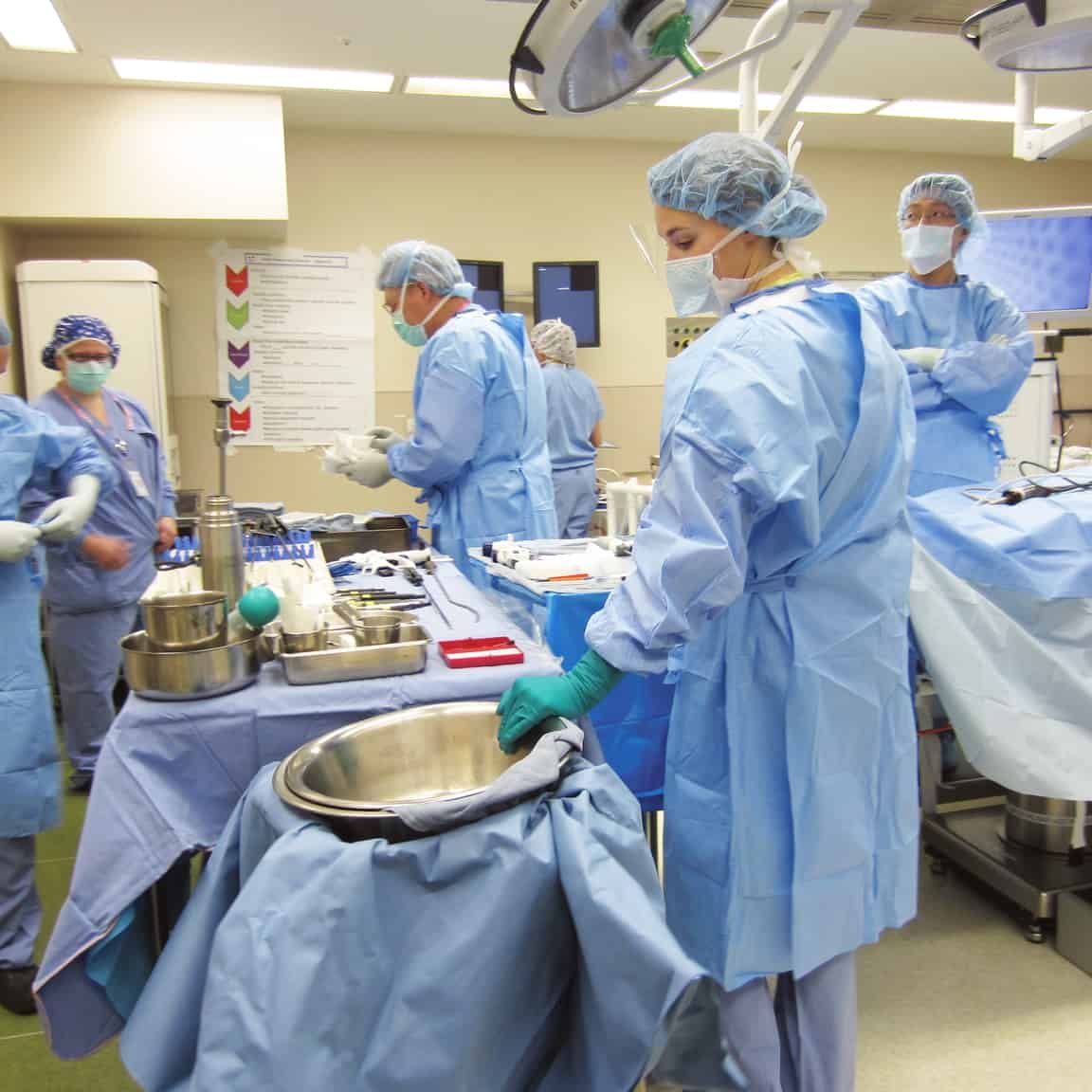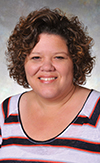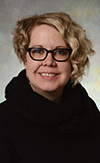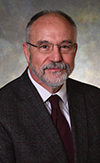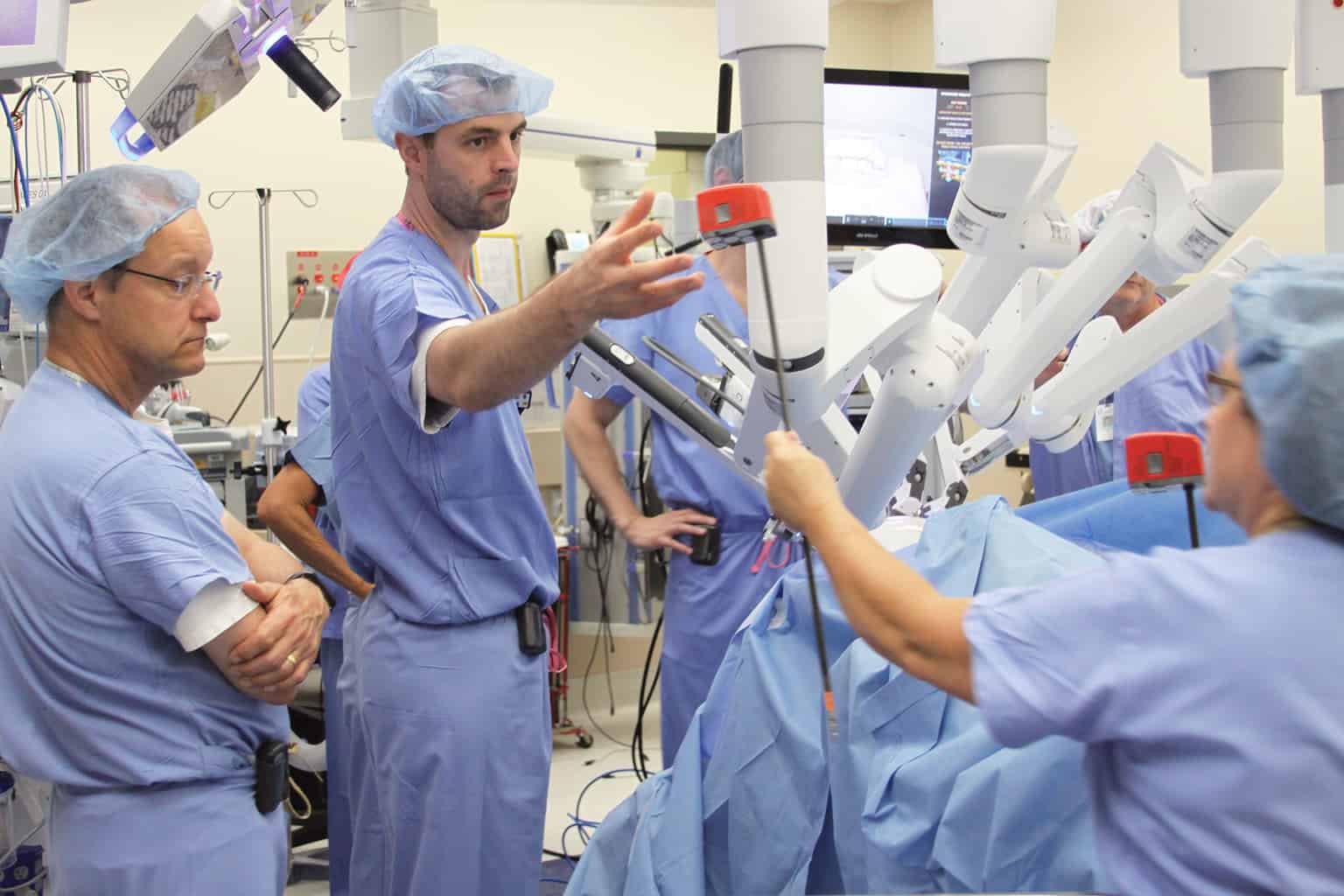
Surgery Residency
5-year categorical program with general surgery emphasis
Early Operative Experience
General surgery emphasis
Level I Trauma Center and regional Burn Center
Rotations in public and private hospital settings
Strong research support ACGME-accredited
About Our Program
Founded in 1955, the Surgery Residency program at Hennepin Healthcare remains at the forefront of clinical training. We prepare our graduates for sought-after positions in general surgery and fellowships.
Working side-by-side with highly trained staff, residents quickly assume critical decision-making skills and gain early operative experience. Our graduates develop clinical skills, diverse experience, and procedural confidence to succeed.
About Our Curriculum
The Surgery Residency provides hands-on education that enables our residents to take an early and active role in patient care, working side-by-side with experienced surgeons and specialists. Rotations at Hennepin Healthcare, as well as the area’s leading private, community, and children’s hospitals, provide a well-rounded experience in all facets of general surgery.
In addition to our own didactics and training in the Interdisciplinary Simulation and Education Center, our program integrates the latest surgical curriculum, including:
- The Surgical Council on Resident Education (SCORE)
- The American College of Surgery (ACS)
- Advanced Trauma Operative Management (ATOM)
- Fundamentals of Laparoscopic Surgery (FLS)
All residents must publish a research project of their choice prior to graduation. Our full-time education director provides one-on-one guidance for these projects.
Didactics
Departmental Conferences and Simulation Center Training
About Our Educational Experience
Hennepin Healthcare’s Surgery Residency requires all residents to attend our mandatory departmental conference each Tuesday. Surgical residents can also participate in a variety of optional, hospital-wide conferences on topics ranging from ethics to critical care.
Our program takes full advantage of Hennepin Healthcare’s state-of-the-art Interdisciplinary Simulation and Education Center to help residents prepare for real-life surgical situations and SICU leadership.
Didactic Opportunities
Required Weekly Conference
- Every Tuesday
- Morbidity and mortality discussion
- Topical and science-based lectures
- Hands-on simulation training in Hennepin Healthcare’s Interdisciplinary Simulation and Education Center
Optional Departmental Conferences
-
- Every Wednesday, noon
- Topics rotate weekly
- 1st Wednesday: SICU
- 2nd Wednesday: American Board of Surgery In-Training Exam (ABSITE) review
- 3rd Wednesday: Journal club
- 4th Wednesday: Gastrointestinal and oncology
- 5th Wednesday: Professional development
Burn Conference
-
-
- First Wednesday of the month, 1 p.m.
-
Optional Hospital Conferences
-
- Critical care (STAB) conference featuring review and discussion of selected critical cases from the previous week
- Ethics
- Medicine grand rounds
- Pediatrics grand rounds
Faculty
Dedicated Faculty with a Passion for Critical Care
Fifteen core faculty lead the Surgery Residency at Hennepin Healthcare. Our faculty bring long tenures with Hennepin Healthcare and play an integral role in our healthcare system’s operations.
Program leadership
- Dr. Mark J. Hill, Chief, Department of Surgery, Hennepin Healthcare
- Dr. Richard Zera, Program Director, Surgery Residency, Hennepin Healthcare
- Dr. Frederick Endorf, Assistant Program Director, Surgery Residency, Hennepin Healthcare
- Dr. Abigail Madans, Assistant Program Director, Surgery Residency Hennepin Healthcare
- Rachel Nygaard, Assistant Program Director, Surgery Department Research Director
Areas of Expertise
Our faculty share their dedication and expertise in a variety of key disciplines.
Colorectal Surgery
Heather Rossi, MD
Burn Surgery
Dr. Frederick Endorf
Dr. Ryan Fey
Dr. Jon Gayken
Dr. Kyle Schmitz
General Surgery and Trauma
Dr. Ryan Deisler
Dr. Frederick Endorf
Dr. Ryan Fey
Dr. Jon Gayken
Dr. Mark Hill
Dr. Jon Krook
Dr. Derek Lumbard
Dr. Chad Richardson
Dr. Kyle Schmitz
Dr. Richard Zera
Minimally Invasive Surgery
Dr. Jon Krook
Dr. Abigail Madans
Oncologic Surgery
Dr. Ryan Deisler
Dr. Richard Zera
Surgical Critical Care
Dr. Martin Birch
Dr. Ryan Deisler
Dr. Frederick Endorf
Dr. Ryan Fey
Dr. Jon Gayken
Dr. Mark Hill
Dr. Jon Krook
Dr. Chad Richardson
Dr. Kyle Schmitz
Thoracic Surgery
Dr. Mark Solfelt
Transplant Surgery
Dr. Mark Hill
Dr. Chad Richardson
Vascular Surgery
Dr. Michael Hu
About Our Rotations
From day one, our residents take an early and active role in patient care. Residents work with faculty supervision and obtain decision-making roles quickly. Rotations occur at Hennepin Healthcare and several private practice hospitals around Minneapolis, offering residents a well-rounded and diverse clinical experience with leading specialists.
In general, call is Q4 during PGY-1 and PGY-2, and Q5 starting PGY-3. Call is Q4 during the majority of rotations in PGY-5. There is no night float.
PGY-1
During the PGY-1 year, residents rotate in eight areas of study, with durations ranging from two to four weeks to two months. Rotations emphasize general surgery, with an introduction to related fields such as emergency medicine, urology, anesthesia, radiology, and critical care. All rotations take place at the Hennepin Healthcare campus.
PGY-2
In PGY-2, residents assume the first point of contact for Hennepin Healthcare’s general surgery and neurosurgery services. Working with dedicated faculty, residents evaluate and assess all trauma and general surgery patients. Five rotations of 10-11 weeks each allow for greater continuity of care for surgical patients.
PGY-3
Working five rotations of 10-11 weeks each, residents gain experience in hospital, community, and private practice surgical settings. Residents assume the primary care of critically ill patients in general surgery, burns, trauma, and cardiovascular surgery. Rotations occur at Hennepin Healthcare and Abbott Northwestern Hospital, a private practice hospital system in Minneapolis.
PGY-4
Residents experience a year of surgical subspecialties during PGY-4, with rotations at Hennepin Healthcare and four other Minneapolis-based hospitals. Five rotations of 10-11 weeks each cover general surgery, pediatrics, vascular, thoracic, and endoscopic procedures, with additional time for research and community rotations.
Hospital sites include:
- Abbott Northwestern Hospital
- Children’s Health Center
- Fairview Southdale Hospital
- VA Minneapolis Healthcare
PGY-5
During the final program year, residents assume the primary management of our general surgery and trauma surgery teams. Residents gain additional experience in surgical oncology, transplants, colorectal, and bariatric surgery. Five rotations of 10-11 weeks each comprise PGY-5, with all rotations occurring at the main Hennepin Healthcare campus.
Significant Autonomy and Leadership Opportunities
PGY-1
Hennepin Healthcare, Anesthesia, Emergency Medicine, General Surgery / Trauma Teams, Neurological Surgery, Plastic / Burn Surgery, Radiology, SICU, Urological Surgery, and an elective (52 weeks split across all of these areas)
PGY-2
Hennepin Healthcare, General Surgery / Trauma Teams, (41.6 weeks)
Hennepin Healthcare, Neurosurgery, (10.4 weeks)
PGY-3
Abbott Northwestern Hospital, General Surgery, (10.4 weeks)
Hennepin Healthcare, Plastic / Burn Surgery, (10.4 weeks)
Hennepin Healthcare, SICU, (20.8 weeks)
Hennepin Healthcare, Vascular Access, (10.4 weeks)
PGY-4
Hennepin Healthcare, Endoscopy / Research, (10.4 weeks)
Abbott Northwestern Hospital, General Surgery, (10.4 weeks)
Children’s Health Center, Pediatric Surgery, (10.4 weeks)
Hennepin Healthcare, Colorectal, Vascular and Thoracic Surgery, (10.4 weeks)
Fairview Southdale Hospital, Vascular Surgery, (10.4 weeks)
PGY-5
Hennepin Healthcare, General Surgery / Trauma Teams, (5 rotations of 10.4 weeks each for 52 weeks)
What Sets Us Apart?
Early operative experience.
Our program enables residents to maximize their time in the operating room. Hennepin Healthcare handles approximately 15,500 procedures annually, all conducted by staff and residents. Residents play a critical role in patient care and learn directly from our faculty, without competition from surgical fellows.
Level I Trauma Center and Burn Center.
At Hennepin Healthcare residents care for patients at all levels of severity, including the region’s most critical cases in our Level I Adult and Pediatric Trauma Center and certified Burn Center. This fast-paced yet team-driven environment exposes residents to the full spectrum of patient pathology and latest procedures and technology.
Diverse clinical experience.
With rotations at Hennepin Healthcare and the Twin Cities’ top private, community, and children’s hospital settings, residents gain experience in a variety of healthcare systems and work with patients from all walks of life. At Hennepin Healthcare, residents care for a multicultural mix of patients who speak dozens of languages—all without ever leaving the hospital.
High tech simulation training center.
Our new, state-of-the-art Interdisciplinary Simulation and Education Center creates the perfect setting for residents to test their clinical skills, communication, and leadership abilities when faced with real-life situations. Residents quickly gain confidence to prepare them for SICU leadership.
Collegial environment.
As an academic system, teaching and research are priorities for all attending physicians. Residents collaborate daily with surgical faculty, as well as staff and residents from numerous other disciplines. This mix encourages constant discussion, a tradition of cooperation and teamwork, and a scholarly approach to patient problems.
Strong research support.
Clinical and quality improvement research is an important part of our program. Every resident works individually with our full-time education director on a research project of their choice.
Application Requirements
Applications Due October 10
Your ERAS application must include:
- Medical school transcripts
- Dean’s letter
- A minimum of three letters of recommendation, preferably from surgeons
- Personal statement
- ERAS Supplemental application
International graduates are encouraged to apply. This program only accepts residents with a green card or J1 visa holders. Must be ECFMG verified to interview and certified by February 1st.
Process
- Submission: Submit your application through the Electronic Resident Application System (ERAS). Contact your medical school’s student affairs or dean’s office for instructions. We do not accept applications through the mail. Hennepin Healthcare participates in the National Resident Matching Program (NRMP).
- Supplemental Application: For the 2023 ERAS® cycle, our program requires all applicants to complete a supplemental ERAS application, offered through the AAMC’s ERAS program. The supplemental ERAS application will be delivered on a survey platform that is separate from the MyERAS application and must be completed between September 1-30.
- Scoring: Each applicant will be scored based on these criteria:
- Supplemental Application
- Board scores
- Research
- Medical school transcripts
- Leadership roles
- Honors and accomplishments
- Dean’s letter
- Letters of recommendation
- Personal statement
- Commitment to surgery
- Interviews: Applicants who meet a score threshold will be invited for interviews. Interviews will be conducted virtually. We will notify you via email regarding interviews. Interviews will be held in November and December.
About Our Facility
Our surgical facilities are located within the main Hennepin Healthcare campus, which spans five city blocks in downtown Minneapolis. We handle cases at all levels of severity, including day-to-day emergencies and disaster response.

